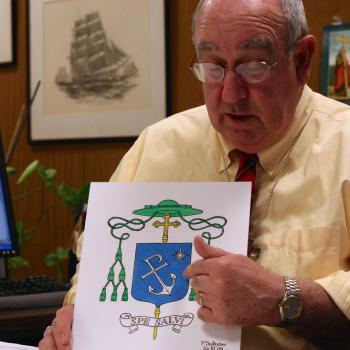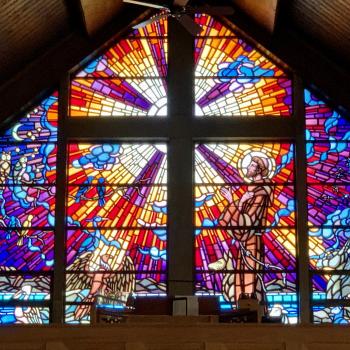I can’t remember the last time a local bishop has written this extensively on the diaconate.
It’s a rare event. But Bishop Alexander K. Sample. of the Diocese of Marquette, has just released a 19-page document on the diaconate that reflects on the vocation — and clarifies some of the deacon’s responsibilities.
Calling the restoration of the diaconate as a permanent ministry a “source of tremendous grace and blessings for the Church,” Bishop Sample said there have been, nonetheless, some “misunderstandings and misinterpretations of the essential identity of the permanent deacon.” To address these issues, a study committee was formed in 2009. The findings of that study informed the bishop’s pastoral letter.
Deacon Don Thoren of Marquette, who was ordained 10 years ago, found the letter to be a confirmation of the role of deacons in the Church. “It’s not like he’s reining us in; it’s the bishop affirming what we do,” Deacon Thoren said. “We’re all behind the bishop.”
“We’re just servants,” said Deacon Thoren who has been very active in prison ministry for 30 years. “We are so fortunate to have Bishop Sample.”
A profound understanding of “diakonia,” or service, is needed to grasp the role of deacons.
The ministry of today’s deacons includes “service to the poor, the imprisoned, to the sick and to those who are abandoned and lonely, the modern day ‘widows and orphans.’ (cf. Acts 6),” Bishop Sample wrote.
Looking to the history of the diaconate, Bishop Sample noted that as the work of the Apostles became too demanding, men of “good repute” who met certain qualifications were allowed to share in the daily ministry of the Apostles, including serving at table. However, Bishop Sample explained that Scripture shows us deacons also also preached, baptized, served the Church community and “began to have a liturgical function.”
The bishop also has clarified the deacon’s role as preacher:
With permission of the rector of the church, all deacons of the Diocese of Marquette will have faculties to preach everywhere in the diocese, unless limited on an individual basis. However, it was noted that this is a faculty and not a right and priests should normally deliver the homily at Mass. Lay persons may not give the homily.
However, preaching is not necessarily limited to homilies at Mass. In the liturgical and ecclesial contexts, preaching opportunities occur at wake services, the funeral liturgies outside of Mass, Sunday celebrations in absence of a priest, during the Liturgy of the Hours, and other prayer and liturgical services.
“Preaching on the part of the permanent deacon, taken in the broadest sense, encompasses many things,” Bishop Sample wrote. “A permanent deacon ‘preaches’ first of all by the witness of his life, especially in the marketplace through his teaching and witness to those he encounters in the daily regimen of his life and work. Finally he exercises his role as teacher in the various catechetical roles that he fulfills within the Church.”
Among the entrance requirements to join the diaconal formation program are active involvement in the Church, demonstrated active service, and being prayerful and inclined to further spiritual formation. A candidate must be at least 35 years old, no older than 60 at the time of ordination and have completed at least two years of college. If married, be married only once and for at least five years in a stable and sacramental marriage (candidates cannot be divorced) and willing to remain celibate if his wife precedes him in death. If widowed, have at least two years to heal and recover from the loss; if single, enjoy a stable, settled life with a history of healthy relationships and be willing to accept the gift of a celibate life. Those with a history of substance abuse or grave addictions should be free from such behaviors for at least five years and continue to participate in a “recovery” program.
Additionally, “there must be a clearly identified specific need in the community, authenticated by the bishop in consultation with the pastor, for which the man would one day be ordained to service. Without such a genuine need being identified, a man will not be admitted into the aspirancy program,” Bishop Sample wrote.
You can read the whole letter here.












